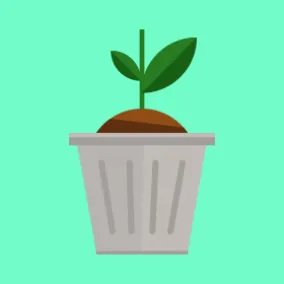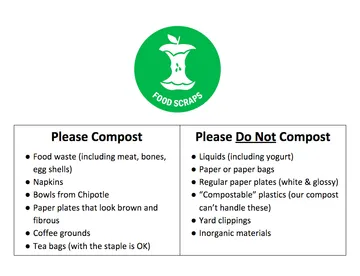Composting at the Office

Sarah Schraer, Former Office Manager
Article Category:
Posted on
Have you ever wanted to start a composting program at the office? Here are some tips to get you started.
Composting has been gaining popularity in the US over the past few years and in the past year, we’ve worked to make it a part of office life at all three of Viget’s offices. Composting has all sorts of benefits including reducing waste in our landfills and reducing the need for chemical fertilizers. All around, composting contributes to living more green and reducing your office’s carbon footprint. Here are some tips on setting up a successful composting program in your office.
Making it happen: Composting Logistics
Depending on where your office is located, composting may be required and already a part of the regular trash removal infrastructure, or you may need to hire a separate company to manage your compost removal.
In June 2015, Boulder, Colorado (home of our third office), passed an ordinance that all businesses must separate recycling and compost from the rest of trash. So in accordance with this law, our composting in the Boulder office is now part of our regular trash service. But, in our other two offices we have to pay for a service to pick up each week. These services can range from $25-$100 a month.
Where to locate the bins
Centrally located is best, of course! In our headquarters we have our main bin out in the open in the kitchen with a sign that clearly labels it as compost. We also have a secondary bin under our first floor coffee bar. In Boulder, we have built in trash, recycling, and compost bins in our kitchen island-- so you open just one drawer and can decide where your waste best belongs. If you have to take your composting out like a regular trash bag, you might consider using biodegradable liners so you don’t have to worry about separating things at the dumpsters.
Getting staff on board
When we first got our bin at the company’s headquarters in Falls Church, VA, we had to retrain our brains to make composting a regular part of life. I posted signs on our refrigerator and above the compost bin to remind people what was compostable (full disclosure, that adorable image of the apple core is from google image search). I also announced each week what was compostable at our Friday all-company lunches (which is where the bulk of our compost comes from).

After a few weeks of frequent reminders, most people got in the habit of composting their lunch scraps, coffee and banana peels. As with all routines, people can easily fall out of them when a vacation, long weekend or other life event takes place; so it’s good to keep signs up and remind people occasionally.
Dealing with K-cups
If your office is like ours, your cup(s) overfloweth with k-cups. Coffee is the second biggest contributor to our office compost bin. For several months we used a Recycle-a-Cup to separate the k-cup pods into compostable coffee and recyclable #7 plastic (Note: #7 plastic isn’t recyclable in all communities but you can ship your pods in to Recycle-a-Cup for free). This plan works well if you’re committed to a specific brand or flavor of k-cup or you’re working with smaller quantities but after a while, we found ourselves drowning in un-separated cups and it was time to come up with a plan B.
Enter compostable k-cups -- yes they make them! We spoke with our composting facilities and found out we could put San Francisco Bay OneCup pod directly into our bins without any additional work. They’re technically only 97% biodegradable but seem to work well in commercial composting facilities.
Avoiding the downsides
Admittedly, there can be some downsides to composting. We’ve tried composting for short stints before this year- most notably, a worm composting bin run by our very own CEO, Brian Williams. The main downside there was that the bin was too small to meet our needs and too much effort for someone to run internally. We’ve found more success using an outside company that changes out our bin once a week.
Fruit flies and smells are another understandable fear. We’ve found that simply having a compost bin with a lid keeps the fruit flies at bay and the smells under control. Coffee grounds also do a lot to control smells - natures natural deodorizer. Frequently emptying the bin also helps prevent flies and smells alike.
Our first year of serious composting has certainly been a learning experience but now, with everyone onboard, we've made our offices a little greener and our contribution to the landfill much smaller.